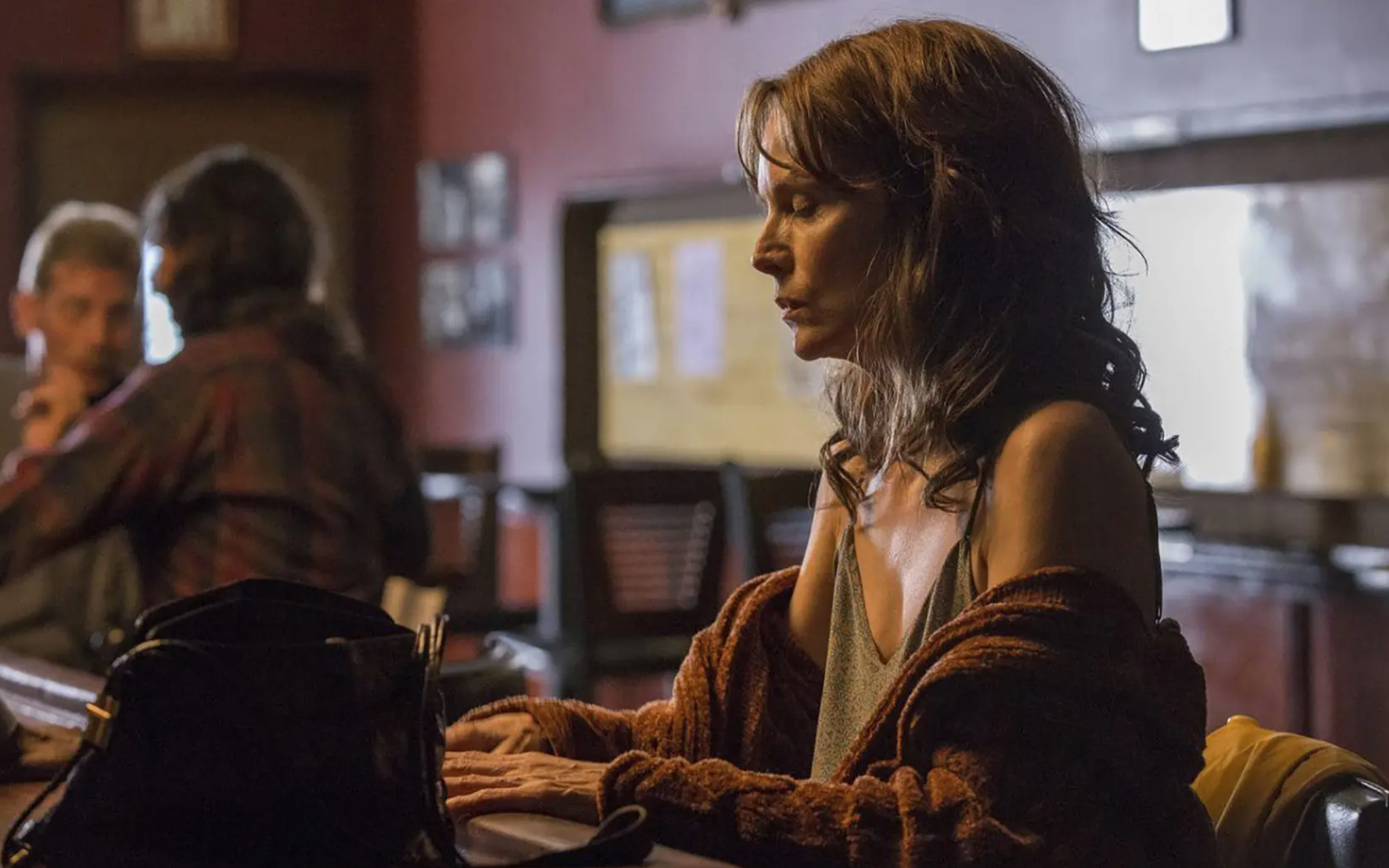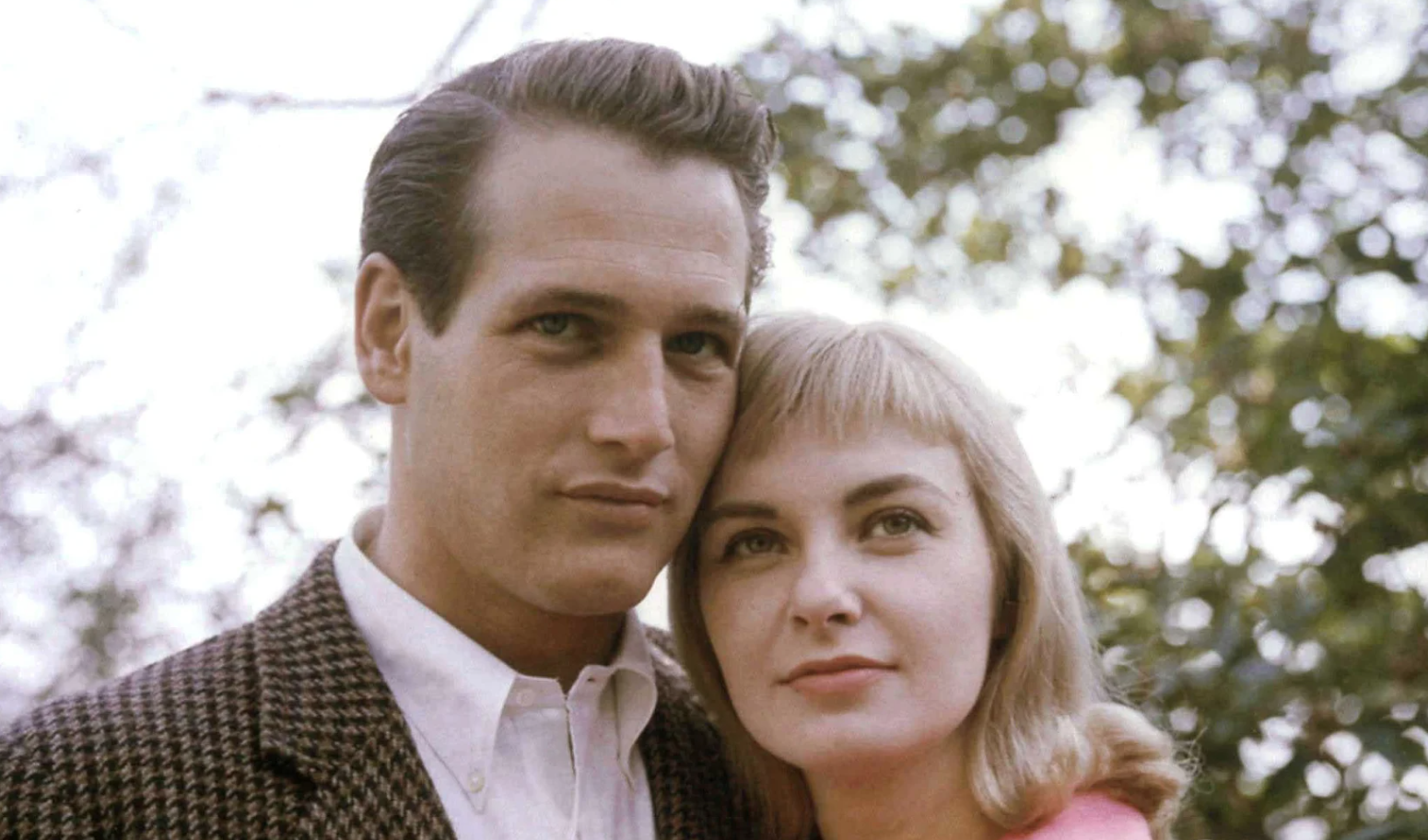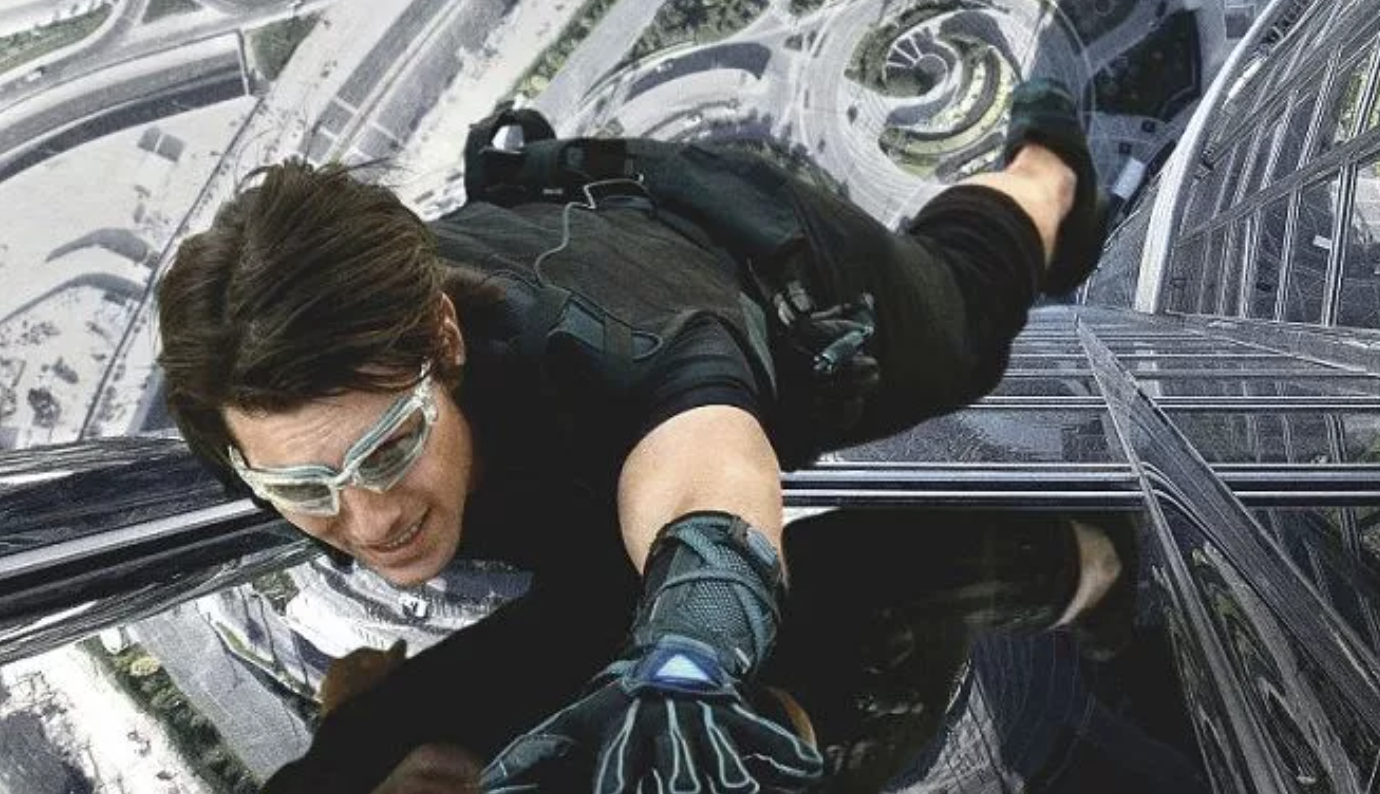None of my business, nothing to say except that Bradley-Huma is no longer “quiet”. If I was an attractive straight woman of a certain social station, I would be somewhat hesitant about anything amorous with Cooper. He scares me a little. Just a little.
Daily
Polanski Could Yet Stroll Down Chandler’s Mean Streets
Hardcore haters of Roman Polanski gonna hate no matter what, but it suddenly appears as if the decades-old rape case against the 88 year-old director might be dropped before long.
THR‘s Winston Cho reported earlier today that the L.A. County District Attorney’s Office “is no longer opposing a request to unseal a former prosecutor’s testimony that Polanski claims will reveal misconduct from [the late Judge Lawrence J. Rittenband], thus warranting dismissal of the decades-old case against him.”
This means that transcripts of closed-door testimony from the original prosecutor handling the case, Roger Gunson, who retired in 2002, will soon be unsealed. This could lead to Polanski being allowed to return to the United States if it’s found that Rittenbrand improperly reneged on the plea deal Polanski’s attorneys allegedly struck with prosecutors over 90 days of psychiatric evaluation.
Excerpt from “The Roman Arena” (’09), written by Phil Nugent:
“Marina Zenovich‘s Roman Polanski: Wanted and Desired has an irresistible story to tell: much of the second half is narrated by the lawyers involved, including the prosecutor David Wells, and their accounts match.
“The villain is the late Judge Lawrence J. Rittenband, a publicity addict who was mainly concerned with how the show…excuse me, I mean the trial, was playing out in the media.
“The title Wanted and Desired comes from a witness to the circus who notes the striking difference between the European reporters who saw Polanski as an important cultural figure and the American TV crews and journalists, who saw him as a malignant dwarf who had come for our women — and Zenovich makes the point that this view was so strong even at the start of Polanski’s Hollywood career that, in the wake of his wife’s murder, the media often treated the director as if he might be complicit in the killings, or at least as if he had somehow brought it on himself by making sicko movies like Rosemary’s Baby.
“According to the lawyers, Rittenband actually called them into his chambers and told them what parts he wanted them to play in scenes that he wanted to act out in the courtroom for the media.
“Ultimately, he agreed, as his little secret with Polanski and the lawyers, to force Polanski to spend a maximum of ninety days in a maximum security prison receiving ‘psychiatric evaluation.’
“Again, according to the lawyers, it was understood that this would be Polanski’s sentence, and that after it was over, he’d be given probation. If true, this would mean that Polanski, for all practical purposes, had already served his sentence when he went on the lam, and both the prosecution team and the psychiatric experts were good with it. But after the shrinks decided that Polanski had had enough and he was turned loose after 42 days, the media decided that he wasn’t showing sufficient public remorse, and Rittenband, upset by the bad press, informed the lawyers that he’d changed his mind and was going to throw the book at the little bastard.
“Gunson recalls that, after that mind-blower, Polanski’s lawyer asked him how he could explain this to his client, and Gunson, to his regret, he says, replied that if Polanski were his own client, he might just tell him to hop the next plane out of Rittenband’s magic kingdom.
“In the wake of Wanted and Desired, Polanski’s lawyers made a motion to have the case against him dropped. They were quickly followed by an effort by the woman Polanski raped [Samantha Geimer] to drop the charges, saying that the lingering ‘attention’ the case still generated “is not pleasant to experience and is not worth maintaining over some irrelevant legal nicety, the continuation of the case.
“The let’s-drop-this-thing movement ultimately foundered because Polanski refused to return to the U.S. He didn’t trust the District Attorney’s office, and in light of recent events, he may have had the right idea.
“It’s hard for even a conspiracy-phobe like myself not to conclude that what made this case an A-list priority after all this time is that Roman Polanski’s real crime is that he ran away, thrived, and in the process made the law look ridiculous.
“And then, having done all that, he even had the audacity to feel them out about getting his name cleared so that he could visit their fine city again and, after they tried to save face by imposing some restrictions of their own, like asking him to actually show up in a courtroom, walked away again, saying, no — my life’s good, it’s not really that important to me.”
Chappelle Deserves It
Dave Chappelle’s The Closer, his controversial stand-up special that triggered backlash from offended trans people, has landed two nominations for the 2022 Emmys. The Netflix presentation was nominated for best pre-recorded variety special, and another for the director, Stan Lathan. Yes, despite all the rage. (Or because of it.)
Chappelle’s special is competing against Tony Bennett and Lady Gaga’s One Last Time, Adele’s One Night Only, Norm Macdonald’s Nothing Special (posthumous), and Warner Bros. and HBO Max’s Harry Potter reunion.
I love the reactions of ET Canada‘s Carlos Bustamante and Morgan Hoffman to Chappelle’s “What’s In A Name.” They clearly don’t approve and can’t stress enough that Chappelle has caused emotional hurt among some in the trans community. They’re almost like an act, these two — a parody of Millennial sensitives.
Alone Again, Naturally
The Hollywood Reporter has excerpted a passage from Ken Auletta‘s “Hollywood Ending: Harvey Weinstein and the Culture of Silence.” Here’s an excerpt of that excerpt:
“While Miramax employees respected Harvey’s talents, few liked him. ‘I never had a single personal conversation with Harvey…I don’t think he knew if I was married or had a family,’ said a former senior executive who worked closely with him. Most found him cold and remote. He had few industry friends outside Miramax. Despite their scorching verbal battles and sometimes rivalry, Bob remained Harvey’s best friend. And to those in the office, his only friend.
“But even that friendship didn’t last, as Bob voted to terminate Harvey from the Weinstein Company in October 2017, and no longer speaks to his brother.
“Today, Harvey has been transferred from a maximum security prison outside Buffalo, New York, to await trial later this year in Los Angeles. He resides in a medical ward of the Twin Towers correctional facility (450 Bauchet Street, Los Angeles), relying on a wheelchair to move about. He is plagued by spinal stenosis, diabetes, high blood pressure, a steep cholesterol count, a weak heart fortified by a stent, and glaucoma that requires injections to stave off blindness.
“No longer does Harvey have four assistants hovering to execute his orders, or a car with four televisions to screen films as he was whisked to another meeting or premiere. In prison, his telephone calls must go through his lawyers. He has no internet access, and few visitors. Like his brother, his three adult daughters from his first marriage refuse to speak to him. His second wife, Georgina Chapman, divorced him and now dates and walks the red carpet with actor Adrien Brody.
“Harvey Weinstein is very much alone. And although he won’t accept responsibility, he can’t blame anyone but himself.”
Johnson’s Successor?
Mary Elizabeth Truss, 46, is a British politician who’s been a Conservative Party member since ’96, when she was 20. She’s served in cabinet positions under Prime Ministers David Cameron, Theresa May and Boris Johnson. She began serving as Foreign Secretary last year, and Minister for Women and Equalities in ’19.
Two days ago (7.10.22) Truss announced her intention to run in the Conservative Party leadership election, and thereby, if elected, succeed Boris Johnson as British Prime Minister. Her stated influences are Margret Thatcher, Ronald Reagan and the former chancellor of the Exchequer Nigel Lawson.
Honest Question About Feldstein’s Departure
“Why don’t you and others who cover NY theatre just spit it out about Beanie Feldstein bailing out of Funny Girl eight weeks before the scheduled end of the run?
“Why the kid gloves? She wasn’t Streisandy enough, right? Which basically means she wasn’t quite knockout enough (a pretty but thin voice, couldn’t belt the songs like Streisand), which means that the producers made a mistake in hiring her.
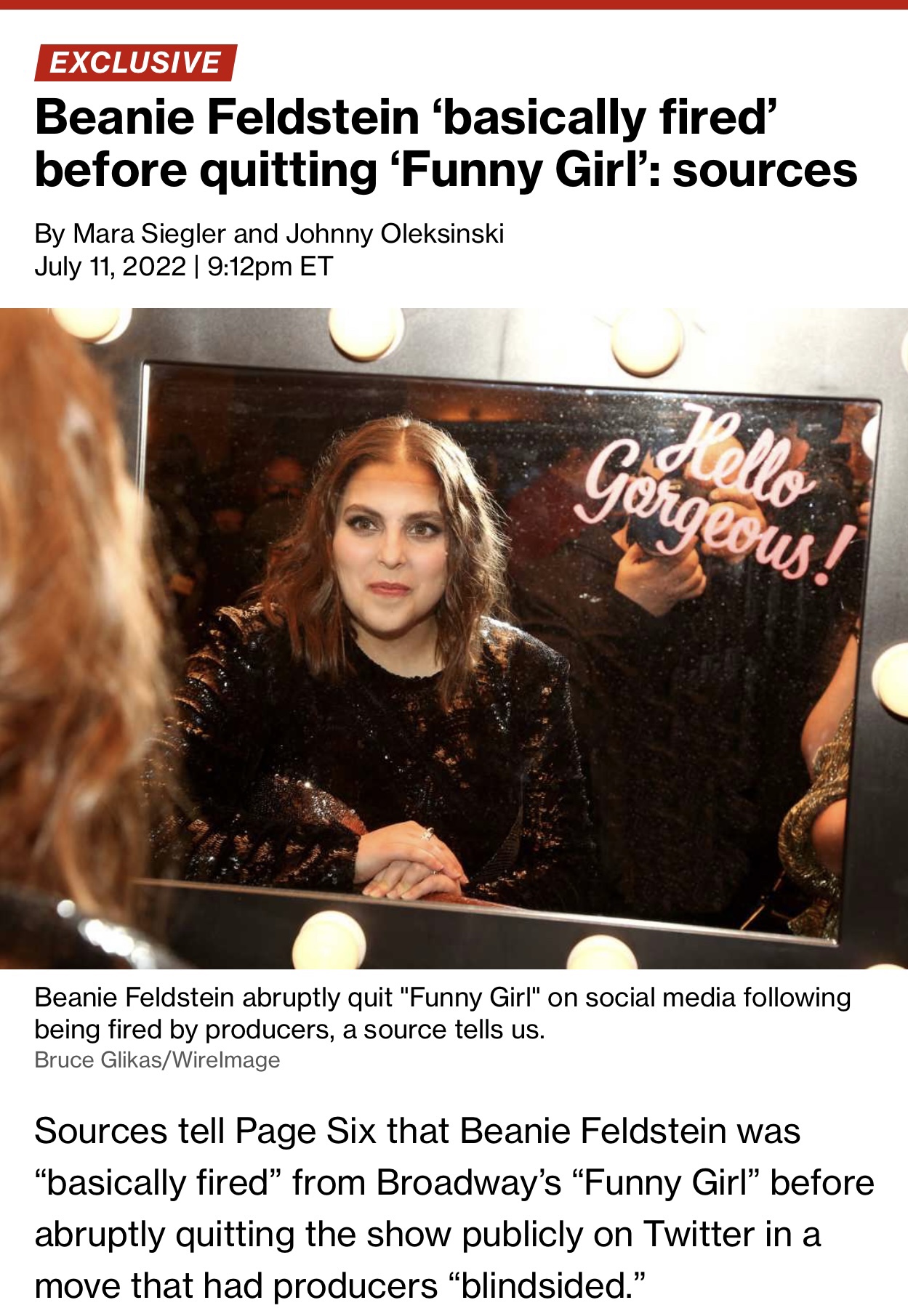
“Plus she didn’t feel good about the reactions (no Tony nom) plus she kept missing shows, which indicates she wasn’t feeling a great deal of confidence, and so she either quit or was nudged aside. I’m presuming that nudged is closer to the truth.
“What’s this weird omerta I’m sensing from everyone? You all seem to be saying ‘we need to handle this story with kid gloves in order to let Beanie down easy.’ New York theatre is a tough realm, and sometimes shows and performances don’t work out.”


I took a stab at translating Beanie Feldstein’s Instagram post: pic.twitter.com/LhMconP66B
— Mark O’Donovan (@mrmarkodonovan) July 11, 2022
.
Unfair Dismissal
On 7.3.22 I stated that before he became the energizer bunny in a series of action franchise films, Tom Cruise was a real actor who delivered like a pro in several top-grade dramas. Mickey Rourke‘s criticism of Cruise is valid if you’re focusing entirely on the franchise stuff, but he was excellent in the following 15 substantial films (in this order and excluding all of his high-powered, robo-bunny formula action franchise films): Jerry Maguire, Collateral, Risky Business, The Firm, Born on the Fourth of July, Rain Man, Jack Reacher, American Made, The Color of Money, Tropic Thunder, A Few Good Men, Edge of Tomorrow, Losin’ It, Interview with the Vampire, Magnolia.
"The guy's been doing the same effing part for 35 years… I got no respect for that."
Mickey Rourke tells Piers Morgan he thinks Tom Cruise is "irrelevant" as an actor.@piersmorgan | @TalkTV | #MickeyRourke | #PiersMorganUncensored pic.twitter.com/joB7OSrcMD
— Piers Morgan Uncensored (@PiersUncensored) July 11, 2022
Deep Freeze
It was reported yesterday that a 64-year-old Florida woman has been charged with failing to report her mother’s death.
The charge was filed more than two months after the mother’s body was found in a freezer in the home they shared. The accused told investigators she bought the deep freezer and put her mother’s body in it so she could keep receiving her disability payments.
In short, real life has mirrored the plots of two interesting films.
One, Andrew Dosunmu‘s Where Is Kyra? (’17), a funereal drama about a middle-aged woman (Michelle Pfeiffer) who not only doesn’t report her mother’s death but pretends to be her mother (i.e., dressing up like her, wearing a wig) so she can pick up those disability checks.
And two, Richard Linklater‘s Bernie (’11), about the 1996 murder of 81-year-old millionairess Marjorie Nugent (Shirley MacLaine) in Carthage, Texas, by her 39-year-old companion, Bernhardt “Bernie” Tiede (Jack Black). After killing Nugent Tiede hid her body in a large freezer inside their home.
Where Is Kyra? opened more than four years ago, and I’ll bet less than 10% of HE regulars have seen it. If that.
HE assessment of Where Is Kyra?, posted on 4.2.18: I’ve been saying all along that Where is Kyra? is “grade A within its realm” and that Michelle Pfeiffer‘s performance is quite the tour de force, but it’s the kind of film that will empty your soul and drain you of any will to live.
I’m not disagreeing with Village Voice critic Bilge Ebiri, whose article, “Michelle Pfeiffer Gives the Performance of Her Life in Where Is Kyra?“, teems with high praise. I’m saying “yeah, it’s very well made but don’t see it if you’re the type that occasionally thinks about suicide because it’ll push you into the abyss.”
I mentioned this impression to Ebiri this morning, and he replied “good…a movie that can convey the exhaustion and desperation of poverty to that degree is essential, and rare.” Yeah, it conveys that, all right, but I know if I consider this kind of creative deliverance to be “essential.”
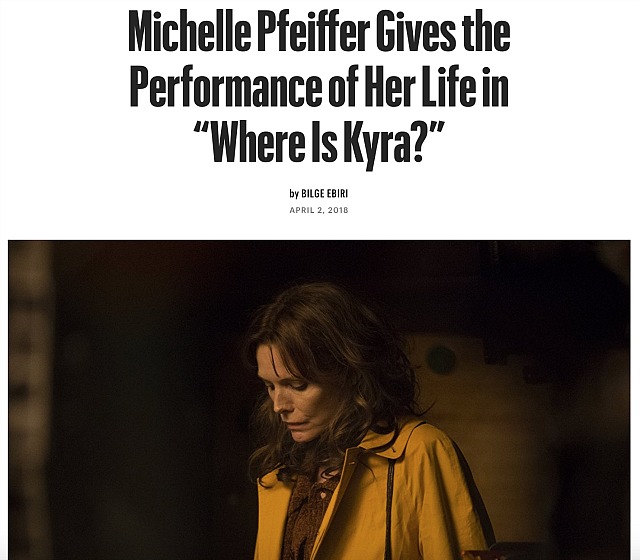
Nobody Has A Perfect Marriage
After debuting at SXSW last March, Ethan Hawke‘s The Last Movie Stars, a six-part doc about the lives and careers of Paul Newman and Joanne Woodward, will begin streaming on HBO Max on 7.21.
I watched the first episode last March, and it’s clear that the focus is on what a wonderful, cooler-than-cool, super-glorious relationship Paul and Joanne had. They first met in ’53 or thereabouts, got married in 1958 and stayed together for 50 years. Paul died on 9.26.08.
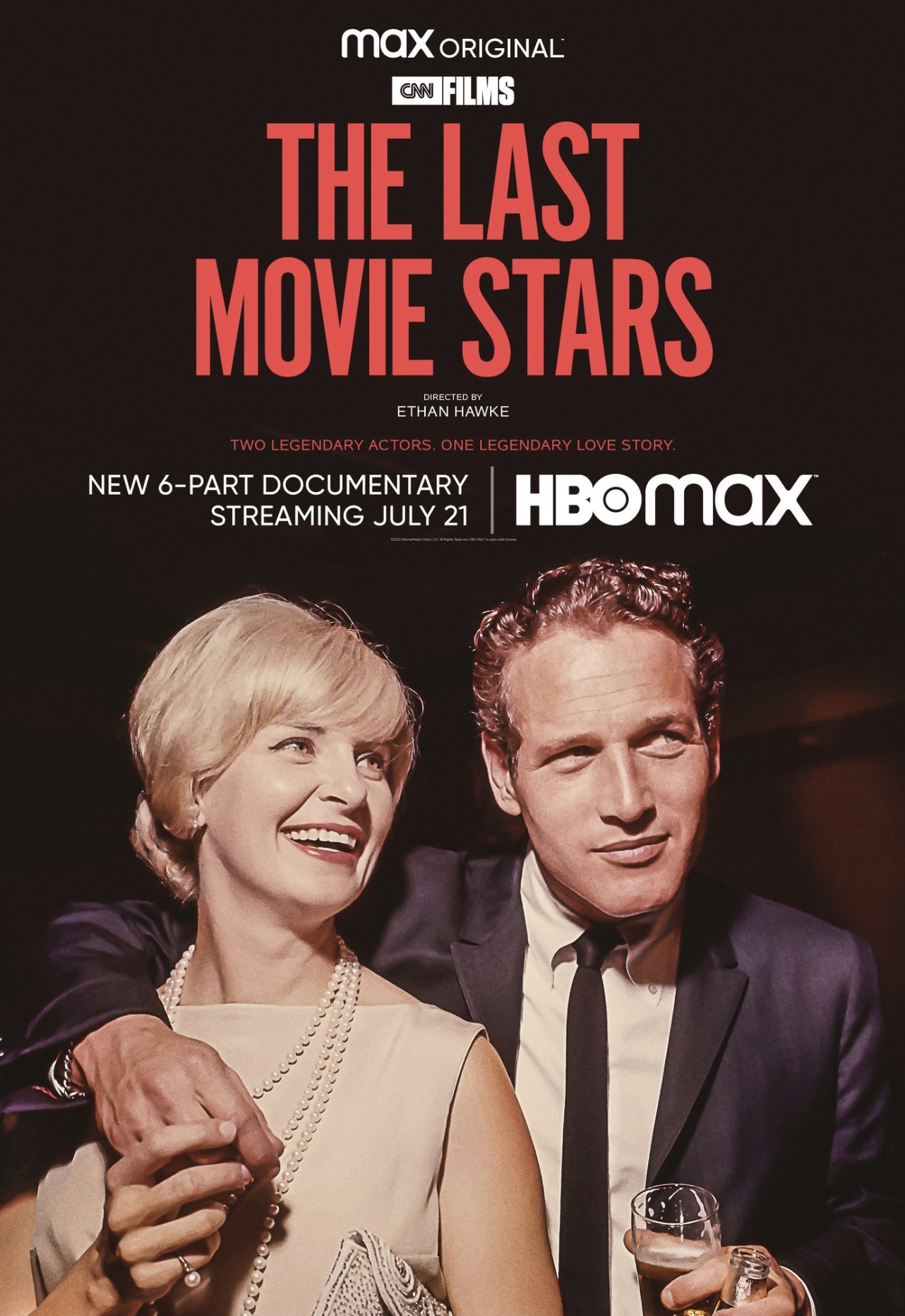
To me the relentlessly celebrated mythology of Paul and Joanne’s marriage has always felt a tiny bit bothersome. As in less than trustworthy.
No marriage is easy or perfect or without issues. A workable, tolerable marriage is almost always the result of very hard work — all kinds of soul-barings, renegotiations and reappraisals at the kitchen table. Which is why portrayals of the Newman-Woodward marriage never seemed quite real to me.
Did they in fact have a strong and healthy marriage? All the accounts say yes, but to me the only thing that makes their history recognizably human (which is to say flawed) is the affair that Paul had with journalist Nancy Bacon in ’68 and ’69. An account of the affair was included in Shawn Levy‘s “Paul Newman: A Life” (2009).
If Ethan’s miniseries goes there, fine. But if he avoids it, he’s a sidestepper.
Friendo who knows the Newman-Woodward story and has dealt with the Newman family: “I haven’t watched the doc, but I’m sure it’s authorized, and as the surviving Newmans don’t care for anything remotely negative being said about their patriarch, I’m confident that it will avoid all unpleasant or even circumspect episodes/behaviors.
“[That said], I do believe that it was a truly golden relationship, built on mutual respect, amusement, tolerance, even passion. So, yeah, too good to be true, but also — for the most part — true.”
And you know what? For the sin of mentioning the 18-month Bacon episode I’m going to be attacked. Because people want to believe what they want to believe.
How SCOTUS Could Help Trump Steal ’24 Election
“It’s Hard to Overstate the Danger of the Voting Case the Supreme Court Just Agreed to Hear,” posted on 6.30.22 by Slate‘s Richard Hasen: “The Supreme Court has agreed to hear Moore v. Harper, an independent state legislature (ISL) theory case from North Carolina. This case has the potential to fundamentally rework the relationship between state legislatures and state courts in protecting voting rights in federal elections. It also could provide the path for election subversion in congressional and presidential elections.”
Cato,org’s Andy Craig, posted on 7.6.22: “Last month the Supreme Court agreed to hear a case next term that could upend election law in the United States. In Moore v. Harper, the court agreed to hear an argument known as the independent state legislature (ISL) theory. This case has the potential to have a wide‐ranging impact and many election law experts are sounding the alarm.”
“The Legal Trick That Could Undermine the 2024 Election—If the Supreme Court Doesn’t Shut It Down“, written by University of Illinois law professor Vikram D. Amar and posted on 6.30.22:
“While the Supreme Court of the United States has rejected Independent State Legislature theory by majority opinion as recently as 2015, four current Supreme Court justices have voiced interest in adopting some version of the doctrine. At the end of its June 2022 term, the Supreme Court agreed to hear a case on the question, Moore v. Harper, in the following term.”
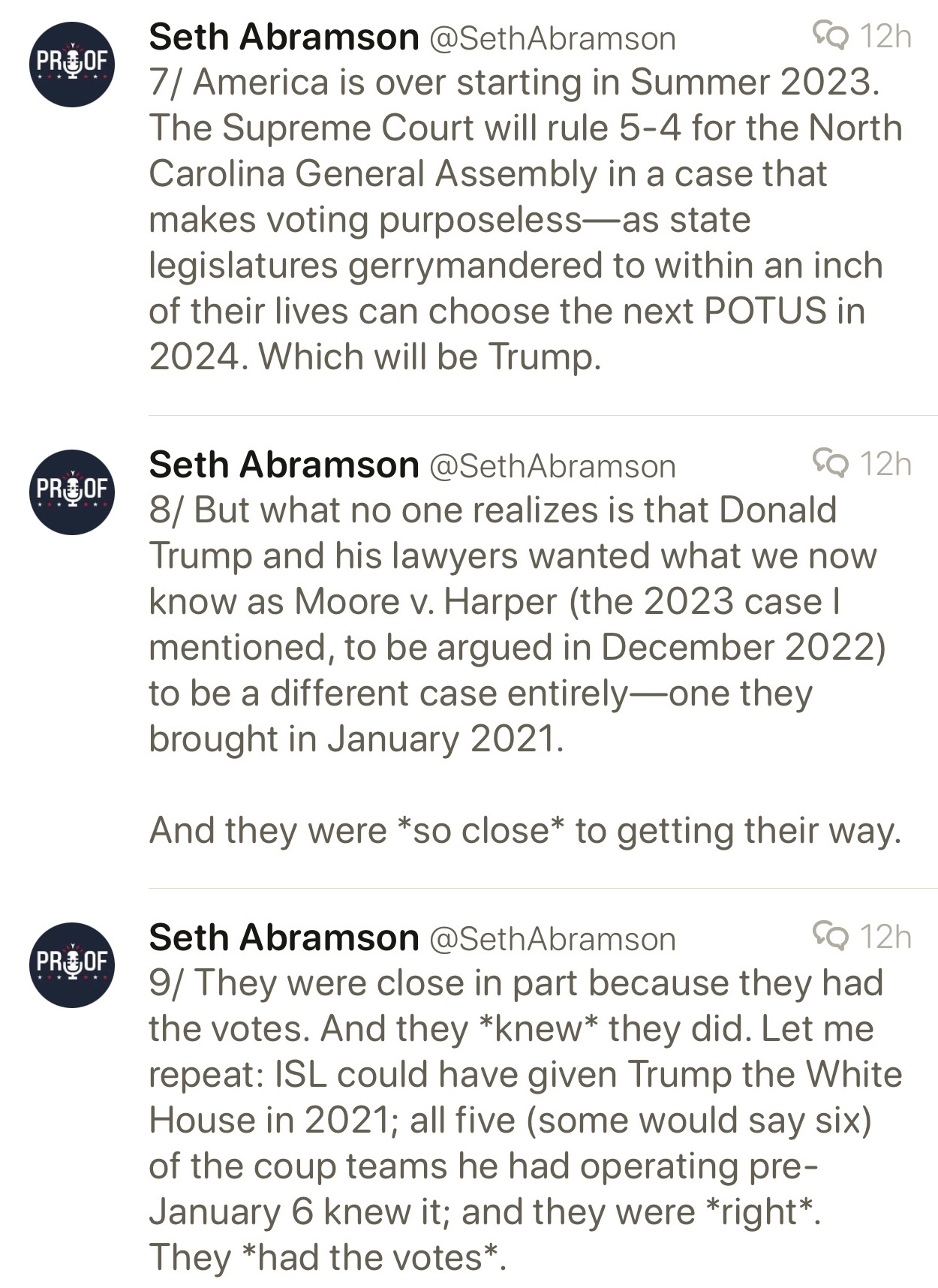
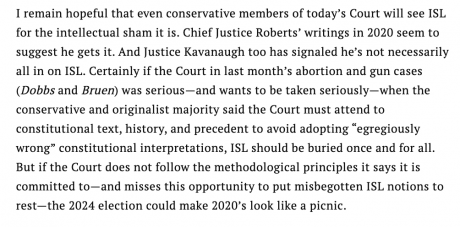

Disbelief Isn’t Entertaining
I disengaged from the Ghost Protocol Burj Khalifa scene almost immediately.
Tom Cruise‘s right-hand grip glove stopped working after 90 seconds of use, he fell 15 or 20 feet but stopped the fall with one grip-glove (the left one), used a firehouse to run down the outside of the bulding and then, toward the end, rappelled along the outside of the building and then leapt toward the open, glass-free window panel. Bullshit. I was so overwhelmed by skepticism that I couldn’t enjoy it.
But Matt Damon’s telling of the “safety guy” story to Conan O’Brien, which I only just listened to this morning…this is entertaining. Why? Because it reveals a certain kind of character trait — hardcore and perfectionist and focused only on the prize — in a funny way.
Jaws ’22
I love it when sea lions show trashy, texting humans who’s boss and make them run for cover. This La Jolla territorial rampage was probably about protecting pups. “Danyourd” tweeted yesterday that the small cove in question is “was built as a safe area for kids to swim. Seals showed up in the 1980s and have overrun and polluted it.”
A group of people were chased by two Sea Lions at a beach in the La Jolla area of San Diego. Lifeguards were on standby in the water ensuring no one was hurt and the sea lions could easily make their way. It's recommended people stay at least 50 ft away from sea lions. 📹: Charli pic.twitter.com/KUhLVns8H7
— Malik Earnest (@MalikEarnest) July 10, 2022

